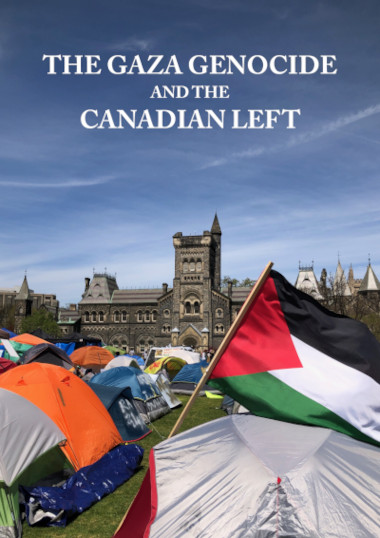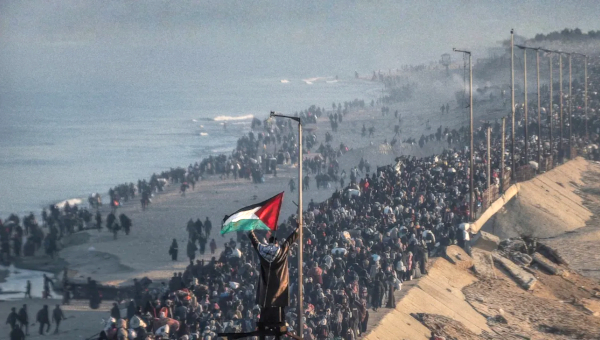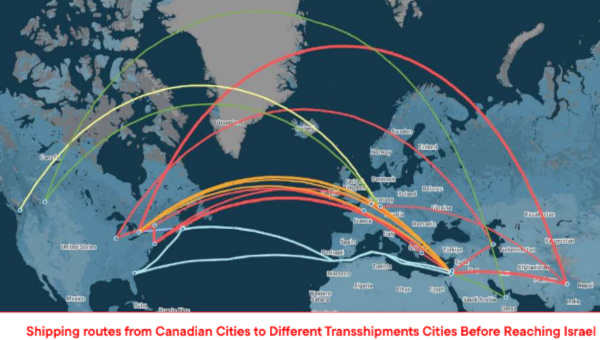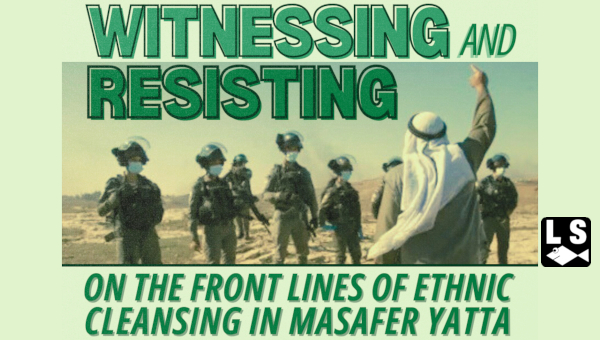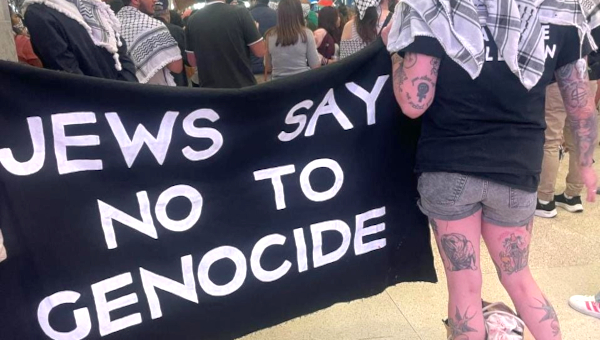The Gaza Genocide and the Canadian Left
Four years ago, the Socialist Project published a pamphlet called Palestine and the COVID Crisis. In it, we published two authors from Gaza: Asmaa Tayeh and Sarah Algherbawi. We believe that both are alive at the time of this writing, but their lives have been altered in ways that – despite their vivid dispatches and the imagery emerging from Gaza – are difficult to fathom.
Asmaa studied English literature at Al-Azhar University and at the time of our last pamphlet was working as the operations manager for We Are Not Numbers, a collective for promoting citizen journalism by young people in Gaza. In December of 2023, the organization’s cofounder Refaat Alareer was killed in what appears to have been a targeted Israeli airstrike; he was one of few Gazan civilians giving frequent updates to the English language media. Less than two weeks ago, a BBC journalist who has been in touch with Asmaa published an account of their conversations, the most recent of which occurred last month. She describes feeling like she now inhabits a horror movie: searching for water; multiple exhausting displacements; she and her family fanning out as they walk from place to place to improve their chances of surviving an aerial attack.
Dispatches from Gaza
Sarah, a writer and translator, has written two dispatches for the Electronic Intifada in the past ten months. When the genocide began, she was halfway through paying off the mortgage on an apartment she had bought five years prior. Now the building has been bombed, her apartment damaged, and she has been in a state of near constant displacement. “I became speechless on several occasions,” she writes. One of these times it was “when I had to evacuate with my family three times in less than forty-eight hours, twice at 4 a.m., when my little children were sleeping and I woke them up terrified from their temporary beds and ran into the street to save our lives.” Now, she adds, “I feel that I will never feel at home again.”
In the past few hours, Sarah has posted to Instagram a tweet by Yosra Aklouk, an Al Jazeera reporter. It reads, “I did not sleep last night: the smell of spilled blood had filled my lungs when I entered the prayer room at Al-Tabaeen school at dawn yesterday. The vision of remains of flesh on roofs, ceilings and walls, and flocked by flies, has not left me!”
These dispatches describe the constancy of loss in Gaza, as friends and family members are murdered without warning, and survivors steel themselves for their own yestashed, their own witnessing of injustice in their final moment. For distant observers, the fear of that moment’s arrival can only be addressed by a real-time message or post. But disasters happen so suddenly in Gaza that any such reassurance is fleeting.
We have seen far more of this genocide than any other while it was ongoing, and I believe the combination of its visibility and its longevity marks it as one of the greatest moral failures in the history of humanity. Never before have we seen this level of international complicity in manifest war crimes.
But those of us on the left have been trying to change course. And we know that we must succeed soon. The death toll in Gaza is now at least 40,000, though if estimates given by Rasha Khatib and her coauthors at The Lancet are correct, that number could easily exceed 200,000. As of June, at least 115,000 Gazans had been displaced to Egypt alone. And at least 92,000 people have been injured – again, probably an undercount. In ten months of genocide, the population of Gaza has quite possibly fallen from 2.3 million to under two million.
Ethnic Cleansing
If this pattern persists for another five years, the whole of Gaza could be ethnically cleansed. At that point what will Israel’s abettors have to say about what occurred? Will they continue to cast aspersions upon the thousands of reports by Gazans, journalists, and human rights defenders? Will they still claim without evidence that the hospitals had to be bombed because they were rife with “terrorists” or that the schools had to be demolished because they were linked to a nefarious Hamas tunnel network? Or will they arrogantly shrug off the question, abstaining from either apology or defensiveness in the face of Palestinians’ righteous aggrievement? In an interview on October 26, Mamadou Sow, a regional head of the International Committee of the Red Cross, stated that the international community must consider that in a case like Gaza, there may be such a thing as acting too late. I think about those words often. Ten months on, it does feel like our governments have opened a wound that will never heal. At the very least, the work of healing that lies ahead will take generations and has hardly begun.
In Canada, as elsewhere, Palestine has grown over the decades from a blip on the horizon of our consciousness to an unignorable crisis. It was seen as puzzling and audacious when in 1972 the Quebecois labour leader Michel Chartrand travelled with a delegation to Lebanon, where they met with Yasser Arafat. Identifying Israel as a “racist country,” Chartrand told the Toronto Star, “We will be regarded as antisemitic, but that is not the real issue. … The Palestinians are fighting for the liberation of their homeland. The occupation of their territory by Israel is completely immoral.”
A decade later, when Israel invaded southern Lebanon, a number of Arab-led organizations emerged, such as the Montreal-based Medical Aid for Palestine, as well as the Toronto-based Near East Cultural and Educational Foundation led by U of T philosophy professor Jim Graff. Following the First Intifada, a group in Toronto including the queer socialist Amy Gottlieb also founded the Jewish Women’s Committee to End the Occupation of the West Bank and Gaza.
I became involved in pro-Palestine politics during the Second Intifada, mostly by joining the weekly vigils outside the Israeli consulate. Strangers would sometimes verbally berate us as they passed by on Bloor Street, their inflamed pink faces poking out the windows of their cars. Politically we were a meagre presence and with the exception of a few veterans like Amy and Jim, we did not really think of ourselves as a movement with a history; because we wished for a resolution to the conflict, we preferred not to think of ourselves as a movement with a future either.
More than two decades on, that has changed. In Canada, as elsewhere, Palestine has become the most central rallying cry for the left, and the movement has become more prominent than perhaps any other in living memory. Its supporters now number in the millions, and our desire for a free Palestine can be seen almost anywhere there is space to express it: pasted to telephone poles, written on bathroom walls, and etched into picnic tables.
The Canadian left has also made some invaluable contributions to the movement in the past two decades. Israeli Apartheid Week was first held at U of T in 2005 and has since spread to at least fifty-five cities worldwide. Queers Against Israeli Apartheid (of which I was a member) was also established in Toronto in 2008 and set an important precedent for similar groups around the world. Amid the current genocide, two of the most effective and articulate critics of Israel in the English broadcast media are Canadian: Diana Buttu, the lawyer and former adviser to the PLO, and Tanya Haj-Hassan, the pediatric intensive care physician who has worked extensively in Gaza.
Our literature is also catching up to this moment, with the recent publication of Advocating for Palestine in Canada: Histories, Movements, Action, edited by Emily Regan Wills et al. and Canada as a Settler Colony: On the Question of Palestine, edited by Jeremy Wildeman and Muhannad Ayyash, both of which cover the specificities of the Palestinian struggle within the settler-colonial and putatively liberal context of Canada. This pamphlet is intended to make a similar contribution by bringing together some of the more ambitious and informative articles that have emerged from the Canadian left since October 7.
Saeed Rahnema gives a concise yet comprehensive overview of the conflict’s history with an eye to the obstacles to peace. Adam Hanieh distills his vision of Middle Eastern geopolitics to highlight the role of both oil and the settler-colonial affinity in the making of unqualified US support for Israel. Sunera Thobani’s essay discusses the centrality of women in the culture of Palestinian resistance, and their commensurate targeting in the current genocide. Turning back to Canada, Larry Haiven discusses the Zionist worldview’s spurious positioning of the Holocaust as the only true genocide in history – the genocide that must always eclipse any other. Martin Lukacs gives a vivid account of how the antisemitism smear has seeped into Canadian policing, with the dizzying result that anti-racist pro-Palestine activists are being baselessly charged with hate crimes. The pseudonymous author Molly Schumann then gives us a vitally important peek behind the curtain at anti-Palestinian bias and censorship at the CBC. Judy Rebick, finally, reflects on the ways in which today’s pro-Palestine movement echoes previous anti-war movements, the progressive effects of which reverberated through many areas of North American life.
In addition to the authors and publications whose original work is reprinted here, thanks are also due to the present photographers who have licensed their work under creative commons. •
The above is the preface to The Gaza Genocide and the Canadian Left.


